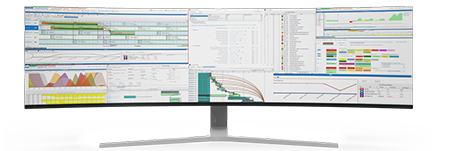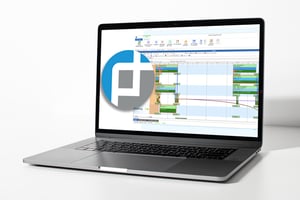Topics: Industrial Manufacturing, PlanetTogether Software, Enhanced Inventory Management, Integrating PlanetTogether, Improved Resource Allocation, Enhanced Resource Planning, Optimized Scheduling, Optimize Supply Chain Logistics
In the dynamic sphere of industrial manufacturing, IT managers are constantly seeking innovative solutions to enhance efficiency and productivity. Quantum computing, a groundbreaking technology, has emerged as a game-changer in this regard.
This blog looks into the integration of quantum computing with existing enterprise resource planning (ERP), supply chain management (SCM), and manufacturing execution systems (MES) like SAP, Oracle, Microsoft, Kinaxis, Aveva, and others, particularly focusing on its role in complex problem-solving within a manufacturing IT environment.

Historically, manufacturing IT has heavily relied on traditional computing systems to manage operations. From the early days of basic data processing to the advent of sophisticated ERP and SCM systems, technology has always been at the forefront of manufacturing advancements. However, with the increasing complexity of manufacturing processes and global supply chains, the limitations of classical computing have become evident.
Quantum computing represents a paradigm shift in computational capabilities. Leveraging the principles of quantum mechanics, it offers exponential increases in processing power. This leap forward is particularly significant for industries like manufacturing, where solving complex optimization problems and simulating intricate processes are crucial.

Complex Problem Solving: Quantum computing excels in areas like optimization and simulation, which are critical in manufacturing. For instance, optimizing the layout of a manufacturing floor or simulating the performance of a new material can be achieved more efficiently with quantum algorithms.
Supply Chain Optimization: Managing a global supply chain involves countless variables and uncertainty. Quantum computing can process this complexity faster, providing more accurate and timely insights for decision-makers.
Predictive Maintenance: By analyzing data from sensors and machines, quantum computers can predict equipment failures before they occur, thus minimizing downtime and maintenance costs.
![]()

PlanetTogether, a prominent player in advanced planning and scheduling (APS) software, stands to gain significantly from quantum computing. Its integration with quantum-capable systems can lead to:
Optimized Scheduling: The ability to analyze numerous variables and constraints in real-time can result in more efficient production schedules, reducing downtime and maximizing output.
Improved Resource Allocation: Quantum algorithms can help in allocating resources more effectively, considering factors like machine availability, labor skills, and material requirements in a fraction of the time required by conventional computing methods.

The integration of quantum computing with manufacturing IT infrastructure, particularly with systems like PlanetTogether and prominent ERP, SCM, and MES platforms, opens new frontiers in solving complex manufacturing problems.
Integration with SAP, Oracle, and Microsoft: Quantum algorithms can significantly optimize the core functionalities of these systems, such as resource planning, inventory management, and supply chain logistics. The quantum advantage lies in its ability to process and analyze vast datasets far more efficiently than traditional computers.
Collaboration with Kinaxis and Aveva: These platforms, known for their advanced SCM and MES capabilities, can leverage quantum computing to enhance predictive analytics and real-time decision-making. Quantum-powered simulations can provide unprecedented insights into production processes, maintenance schedules, and even environmental impact assessments.
While the potential of quantum computing in manufacturing IT is immense, it is not without its challenges. These include:
Technological Maturity: Quantum computing is still in its nascent stages, and widespread commercial application is a few years away.
Integration Complexity: Integrating quantum computing with existing ERP, SCM, and MES systems like PlanetTogether, SAP, or Oracle requires sophisticated approaches and expertise.
Security Concerns: Quantum computing poses new challenges in data security, necessitating the development of quantum-resistant encryption methods.
Despite these challenges, the future of quantum computing in manufacturing IT is bright. Continuous advancements in quantum technology, coupled with increasing collaboration between tech giants and quantum startups, are paving the way for its practical application in industrial manufacturing.
Quantum computing is set to revolutionize the way manufacturing IT tackles complex problems. Its integration with systems like PlanetTogether and various ERP, SCM, and MES platforms will lead to unprecedented levels of efficiency and innovation. As this technology matures, it will undoubtedly become a cornerstone of the manufacturing industry, driving it towards a more efficient, agile, and data-driven future.
Manufacturing IT professionals must stay abreast of these developments, embracing the quantum revolution to remain competitive in an ever-evolving industrial landscape.
As we witness the dawn of the quantum era, it's essential for professionals in this field to prepare for the significant changes and opportunities it brings.
Are you ready to take your manufacturing operations to the next level? Contact us today to learn more about how PlanetTogether can help you achieve your goals and drive success in your industry.
Topics: Industrial Manufacturing, PlanetTogether Software, Enhanced Inventory Management, Integrating PlanetTogether, Improved Resource Allocation, Enhanced Resource Planning, Optimized Scheduling, Optimize Supply Chain Logistics
0 Comments
No video selected
Select a video type in the sidebar.







LEAVE A COMMENT